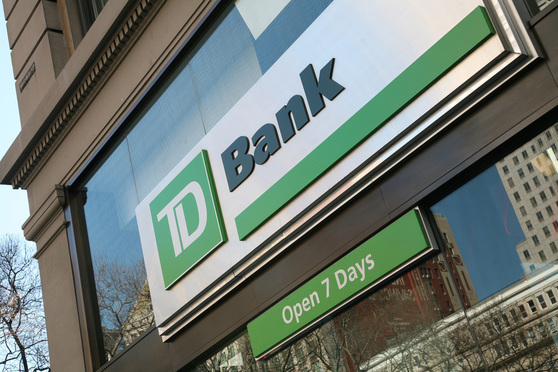TD Bank Sued for Overdraft Charges for Uber, Lyft Services
TD Bank is facing a lawsuit accusing it of improperly assessing overdraft fees for debit card transactions with ride-hailing services Uber and Lyft.
December 06, 2017 at 03:36 PM
4 minute read

TD Bank is facing a lawsuit accusing it of improperly assessing overdraft fees for debit card transactions with ride-hailing services Uber and Lyft.
The suit, filed Tuesday in Camden federal court, was brought by Connecticut resident Britney Lawrence on behalf of national and Connecticut classes of TD Bank debit card holders.
According to the suit, consumers who decline TD Bank's overdraft protection for debit card transactions exceeding their account balance are advised that any such purchases will be declined, with the exception of recurring expenses such as phone and utility bills. But the bank authorized transactions by those customers using Uber or Lyft, and then charges a $35 overdraft fee.
In Lawrence v. T.D. Bank, N.A., Lawrence was hit with a pair of $35 overdraft fees on March 25, 2016, when she used her TD Bank debit card to pay for two rides that left her account overdrawn, the lawsuit claims.
But TD Bank, based in Cherry Hill, New Jersey, states in its personal deposit account agreement that it will decline nonrecurring debit card transactions that result in a negative balance unless customers opt into its Debit Card Cash Advance Program, the lawsuit claims.
“But as to one very significant type of business, one for which it handles literally millions of transactions each month, TD Bank has decided to accept such transactions, and charge related overdraft fees, even though customers have not opted into Debit Card Advance,” according to the lawsuit.
“When TD Bank customers use their debit card to pay for rides with Uber or Lyft—rides that are by their very nature one-time transactions and non-recurring—TD Bank approves the transactions regardless of the customer's opt-in status.”
TD Bank spokeswoman Judith Schmidt declined to comment due to the pending litigation.
TD Bank faces claims for breach of contract and violation of the New Jersey Consumer Fraud Act and the Connecticut Unfair Trade Practices Act. The suit seeks restitution of funds obtained as a result of TD Bank's misconduct, an order requiring it to cease its wrongful conduct, and enjoining it from continuing to conceal its business practices. The suit also seeks a corrective notice campaign.
TD Bank has approximately 1,300 branches in the U.S., and serves 6.5 million customers from Maine through Florida, according to the lawsuit.
The lawsuit was filed by Joseph Sauder and Matthew Schelkopf of McCune Wright Arevalo of Berwyn, Pennsylvania.
Another lawyer for the plaintiffs, Adam Webb of Webb, Klase & Lemond, said similar lawsuits are pending against Bank of America and Wells Fargo. Webb said his firm is also suing TD Bank in a separate class action involving overdraft fees in South Carolina. Webb said he couldn't estimate the class size in the present case.
The complaint also listed eight other firms representing the plaintiffs—Webb, Klase in Atlanta; Kopelowitz Ostrow Ferguson Weiselberg Gilbert in Fort Lauderdale, Florida; Tycko & Zavareei and Kaliel PLLC, both of Washington, D.C.; The Kick Law Firm and the Law Office of Francis J. Flynn Jr., both in Los Angeles; Sullivan Law & Associates of Bloomington, Indiana; and Consumer Protection Legal of Ellisville, Missouri.
Lawrence and some of her lawyers in the present case have sued TD Bank before, the complaint states, although no details are provided. Lawrence “has proven herself to be active and involved as a class representative in separate action against TD Bank,” and “is passionate about this litigation personally and will prosecute this action vigorously for the benefit of the members of the classes,” the complaint states.
This content has been archived. It is available through our partners, LexisNexis® and Bloomberg Law.
To view this content, please continue to their sites.
Not a Lexis Subscriber?
Subscribe Now
Not a Bloomberg Law Subscriber?
Subscribe Now
NOT FOR REPRINT
© 2025 ALM Global, LLC, All Rights Reserved. Request academic re-use from www.copyright.com. All other uses, submit a request to [email protected]. For more information visit Asset & Logo Licensing.
You Might Like
View All

NJ Firm Narrowly Avoids Case Dismissal Over Lengthy Complaint Filed in Fed Court
4 minute read
On the Move and After Hours: Meyner and Landis; Cooper Levenson; Ogletree Deakins; Saiber
3 minute read
AstraZeneca Files Flurry of Lawsuits to Protect Cancer Treatment Drug
3 minute readTrending Stories
- 1DOT Nominee Duffy Pledges Safety, Faster Infrastructure Spending in Confirmation Hearing
- 2'Younger and Invigorated Bench': Biden's Legacy in New Jersey Federal Court
- 3'Every Single Judge on Board': First-Impression Case Revived
- 4NYSBA Annual Meeting: How In-House Counsel Navigate Gen AI Risk
- 5A Judge Ordered Squabbling Lawyers to Have Lunch: Here's What Happened
Who Got The Work
J. Brugh Lower of Gibbons has entered an appearance for industrial equipment supplier Devco Corporation in a pending trademark infringement lawsuit. The suit, accusing the defendant of selling knock-off Graco products, was filed Dec. 18 in New Jersey District Court by Rivkin Radler on behalf of Graco Inc. and Graco Minnesota. The case, assigned to U.S. District Judge Zahid N. Quraishi, is 3:24-cv-11294, Graco Inc. et al v. Devco Corporation.
Who Got The Work
Rebecca Maller-Stein and Kent A. Yalowitz of Arnold & Porter Kaye Scholer have entered their appearances for Hanaco Venture Capital and its executives, Lior Prosor and David Frankel, in a pending securities lawsuit. The action, filed on Dec. 24 in New York Southern District Court by Zell, Aron & Co. on behalf of Goldeneye Advisors, accuses the defendants of negligently and fraudulently managing the plaintiff's $1 million investment. The case, assigned to U.S. District Judge Vernon S. Broderick, is 1:24-cv-09918, Goldeneye Advisors, LLC v. Hanaco Venture Capital, Ltd. et al.
Who Got The Work
Attorneys from A&O Shearman has stepped in as defense counsel for Toronto-Dominion Bank and other defendants in a pending securities class action. The suit, filed Dec. 11 in New York Southern District Court by Bleichmar Fonti & Auld, accuses the defendants of concealing the bank's 'pervasive' deficiencies in regards to its compliance with the Bank Secrecy Act and the quality of its anti-money laundering controls. The case, assigned to U.S. District Judge Arun Subramanian, is 1:24-cv-09445, Gonzalez v. The Toronto-Dominion Bank et al.
Who Got The Work
Crown Castle International, a Pennsylvania company providing shared communications infrastructure, has turned to Luke D. Wolf of Gordon Rees Scully Mansukhani to fend off a pending breach-of-contract lawsuit. The court action, filed Nov. 25 in Michigan Eastern District Court by Hooper Hathaway PC on behalf of The Town Residences LLC, accuses Crown Castle of failing to transfer approximately $30,000 in utility payments from T-Mobile in breach of a roof-top lease and assignment agreement. The case, assigned to U.S. District Judge Susan K. Declercq, is 2:24-cv-13131, The Town Residences LLC v. T-Mobile US, Inc. et al.
Who Got The Work
Wilfred P. Coronato and Daniel M. Schwartz of McCarter & English have stepped in as defense counsel to Electrolux Home Products Inc. in a pending product liability lawsuit. The court action, filed Nov. 26 in New York Eastern District Court by Poulos Lopiccolo PC and Nagel Rice LLP on behalf of David Stern, alleges that the defendant's refrigerators’ drawers and shelving repeatedly break and fall apart within months after purchase. The case, assigned to U.S. District Judge Joan M. Azrack, is 2:24-cv-08204, Stern v. Electrolux Home Products, Inc.
Featured Firms
Law Offices of Gary Martin Hays & Associates, P.C.
(470) 294-1674
Law Offices of Mark E. Salomone
(857) 444-6468
Smith & Hassler
(713) 739-1250






